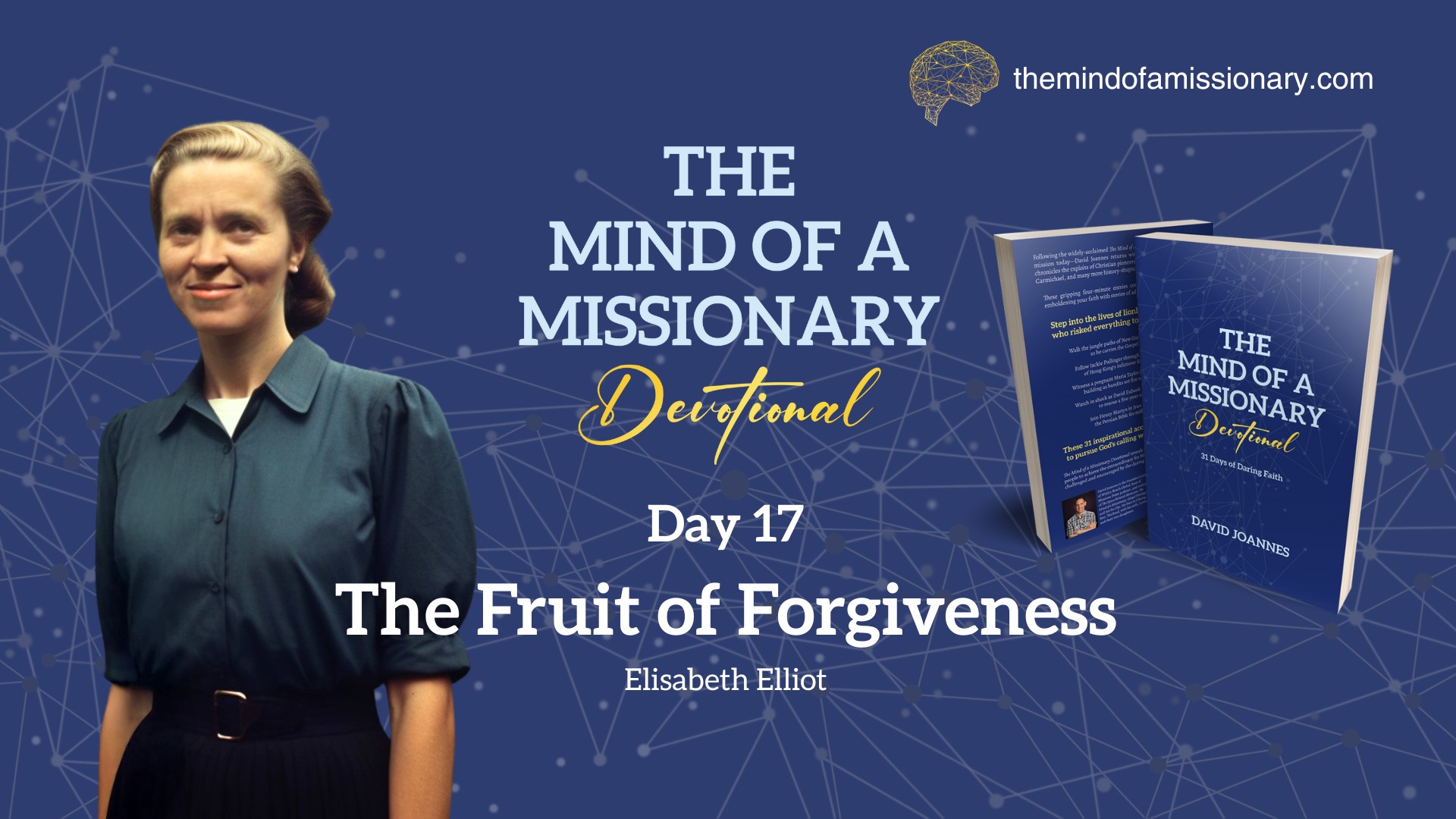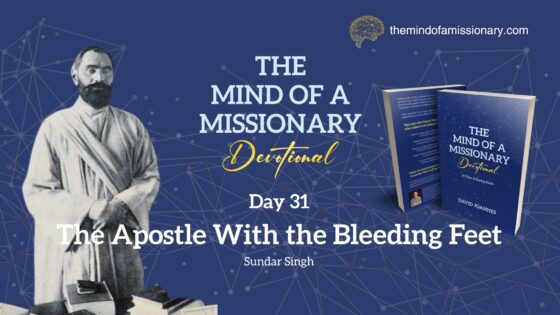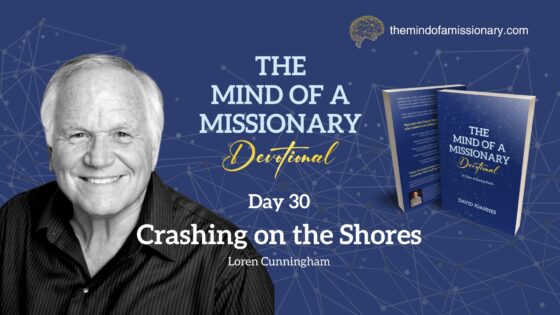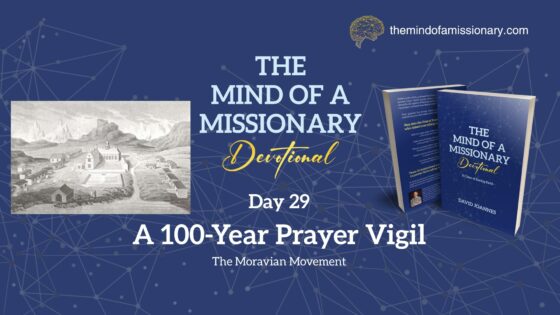Day 17
The Mind of a Missionary Devotional
The Fruit of Forgiveness
Elisabeth Elliot
“See, I am doing a new thing! Now it springs up; do you not perceive it? I am making a way in the wilderness and streams in the wasteland.” — Isaiah 43:19
“Jim’s thirty-first birthday, our fifth wedding anniversary—and today I met one of my husband’s killers.” Elisabeth’s fingers trembled as she penned an entry in her diary on October 8, 1958. The Curaray River meandered through the Ecuadorian jungle nearby. Yes, the Curaray, where Jim was lanced with spears almost three years earlier. The warm current mingled with missionary blood not long ago. Elisabeth’s heart rate quickened at the thought; she took a long breath as the jungle conjured traumatic memories. What am I doing in this unlikely spot? she wondered. Sitting in a tiny leaf-thatched hut with the Waorani men who took her husband’s life felt like a strange dream after a long night of fitful tossing.
Elisabeth wasn’t the only one who lost her husband to the violent tribe. Ed McCully, Roger Youderian, Pete Fleming, and their pilot, Nate Saint, joined Jim on the mission to reach the Waorani tribe (also known as the “Auca”), an indigenous group in Ecuador notorious for their hostility towards outsiders. On January 8, 1956, the mission met a tragic end when all five men were killed by the tribe they sought to evangelize. The world was shaken by the news of the young men’s deaths, and the story of these missionaries, who had sacrificed their lives for the sake of the Gospel, spread far and wide.
Most people would have packed their belongings and left the Ecuadorian rainforest after such a horrific event. But not Elisabeth Elliot. Her response to the heart-wrenching tragedy was nothing short of extraordinary. Instead of harboring bitterness or retreating in fear, she chose the path of forgiveness and love. In her book, Through Gates of Splendor, she expressed her deep desire for the salvation of the Waorani people, reflecting Christ’s heart for those who caused her so much pain. “The prayers of the widows themselves are for the Aucas,” she wrote about herself and the wives of the four other slain men. “We look forward to the day when these savages will join us in Christian praise.”
The stalwart missionary continued ministering in Quichua, not far from Waorani lands. But the plot took a dramatic turn when several Waorani women emerged from the jungle on November 13, 1957. They had come with the invitation Elisabeth desired more than anything: an offer to live with the stone-age tribe.
Driven by a transcendent, Spirit-led motivation, Elisabeth, her three-year-old daughter Valerie, and Rachel Saint, the sister of fellow martyr Nate Saint, moved in with the Waorani on October 8, 1958. Immersing themselves in the daily life and culture of the people, they ate whatever the tribe ate: wild turkey, fish, birds, even a monkey arm—its fingers clenched and blackened by fire. Young Valerie, unaware of the potential dangers of her surroundings, made herself at home in the jungle. “Just about ten feet away sit two of the seven men who killed my husband,” Elisabeth wrote. “Gikita, one of the men, has just helped Valerie roast a plantain.” God was moving behind the scenes, working to unveil His salvation plan to the missionaries’ jungle hosts.
The watching world took note of the extraordinary event. “Child Among Her Father’s Killers: Missionaries Live With Waorani,” a LIFE Magazine headline announced on November 24, 1958. Elisabeth’s willingness to live near the men responsible for her husband’s death, showing them Christ’s love in action, demonstrated the Gospel’s transformative power. But she was no superhero. Her tragic loss, still fresh in her mind, filled her with inner turmoil. “I could almost say I’ve had enough of these Waorani and wish God would take me away,” she wrote. “But if God wants me to stay, He will give me grace to remain here,” she concluded. “By His grace, I will do all that He intends for me to do to reach them.”
For three years, Elisabeth lived among the Waorani, ministering to them, sharing the love of Christ, and witnessing a remarkable transformation within the tribe. Her life and work among the people group paved the way for many of them to embrace the Christian faith, including some of those involved in her husband’s killing.
The five missionaries who laid down their lives in 1956 propelled the Gospel beyond human imagination. As they became seeds in the heart of the jungle, salvation grew from the very soil where they fell. Elisabeth Elliot watered those seeds, leaving the rest to God. Thus, people living in a land of darkness began to see a great light. The grace of God, like the sun’s warmth, caused a mighty harvest to bloom among the Waorani people at last.
– Personal Response –
Passage: See, I am doing a new thing! Now it springs up; do you not perceive it? I am making a way in the wilderness and streams in the wasteland. (Isaiah 43:19)
Point: Forgiveness clears the ground for God to do miraculous new things.
Ponder: Are you willing to lay down your pain so that God’s love can rise in its place?
Prayer: Lord, give me the strength to forgive even when it hurts, and to trust You to bring beauty from my brokenness. In Jesus’ name, amen.
Proclamation: I will not be ruled by revenge. I choose forgiveness and will watch God do a new thing. I will cast all my cares at the feet of Jesus, allowing His love to flow in and through my life.
Practice: Write a letter (even if you don’t send it) releasing someone who hurt you, and ask God to bless them.
Learn more about The Mind of a Missionary Devotional at themindofamissionary.com




